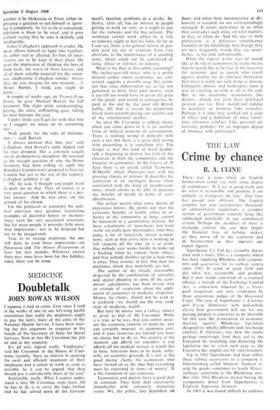MEDICINE
Doubletalk
JOHN ROWAN WILSON
I suppose it had to come. Ever since I read in the works of one of our left-wing health economists that really the employers ought to pay the lion's share of the costs of the National Health Service, I have been wait- ing for this argument to reappear in the mouth of the Secretary of State for Social Services. Now at last Mr Crossman has put an end to my suspense.
It's all very logical really. 'Employers,' said Mr Crossman in the House of Com- mons recently, 'have an interest in securing the swift and efficient treatment of their employees and a return to work as soon as possible. So it can be argued that they should pay a considerable share of the cost.'
Irrefutable, really. What I cannot under- stand is why Mr Crossman stops there. All he has to do is to carry the logic further and he has solved most of the Govern-
ment's taxation problems at a stroke. In- dustry, after all, has an interest in people getting to work on time, so it ought to pay for the railways and the bus services. The workman cannot work unless he is fed, so industry ought to buy his food. So far as I can see, there is no general service at pre- sent paid for out of taxation, from free abortions to the maintenance of a standing army, which could not be considered of value, direct or indirect, to industry.
What is the flaw in this subtle reasoning? My twelve-year-old niece, who is a pretty shrewd cookie where economics are con- cerned, suggests a possible snag. She points out that since industrialists are so far not permitted to mint their own money, such a payroll tax would have to go on the price of the goods, and would in consequence be paid in the end by the poor old British public. All, that is, except the proportion which went towards pricing our exports out of the international market.
So what Mr Crossman is talking about, when you come down to it, is yet another form of indirect taxation on consumption.
There is nothing wrong in principle with such a tax, but there is a great deal wrong with pretending it is something else. The danger is that this kind of fiscal double- talk is beginning to destroy the faith of the electorate in both the competence and the integrity of economists. In the Lancet of 28 June there is an article called 'Economic Ill-Health' which illustrates very well the growing climate of distrust. It describes the confusion of an intelligent doctor when confronted with the kind of pseudo-econ- omics which claims to be able to measure the benefits of health in terms of cost- effectiveness.
The author asserts what every doctor of experience knows. He points out that the economic benefits of health, either to in- dustry or the community at large, cannot be measured in a quantitative fashion. All these calculations of 'man-hours lost from work' are really quite meaningless, since they make a lot of hopelessly unreal assump- tions; such as that every man is working at full capacity all the time he is at work, that nobody ever works harder to make up a backlog when he returns from illness, and that nobody doubles up for a man who is away. They assume, in fact, that men are machines, which they manifestly are not.
The author of the article, reasonably disgusted by the combination of unreality and special pleading in some of the econ- omists' calculations, has been driven into an attitude of scepticism about the appli- cation of economics to medicine altogether. Money, he claims, should not be used as a yardstick—we should use the true yard- stick of medicine, health.
But here he moves into a fallacy almost as great as that of Mr Crossman. While it is true, as he says, that you cannot meas- ure the economic rewards of medicine, you can certainly measure its economic cost, and if your resources are limited you have no choice but to do so. No country at the moment can afford (or considers it can afford) all the medical services it would like to have. Selections have to be made, willy- nilly, on economic grounds. It is not, as the good doctor claims, the economists who have 'foisted on us the idea that everything must be examined in terms of money'. It is the limitation of our resources.
Economists and doctors have a good deal in common. They both deal (necessarily imperfectly) with extremely important issues. We, the public, feel dependent on them, and when their incompetence or dis- honesty is revealed, we are correspondingly outraged. It seems monstrous to us when they contradict each other on vital matters, as they so often do. And the vice of both professions is a defensive complacence founded on the knowledge that though they are very frequently wrong they are never- theless, in the end, indispensable.
When the Lancet writer says he would like to be rid of economists he really means that he would like to be free of the necessity for economy--just as people who revolt against doctors try to convince themselves that there is really no such thing as disease. Unhappily, disease and bankruptcy have a way of catching up with us all in the end. But in the meantime, economists, like doctors, should not push their privileged position too far. They should not indulge in quackery or promote fake remedies. Perhaps it is time they worked out a code of ethics and a definition of what consti- tutes infamous conduct. Like personal ad- vertising, perhaps? Or an improper degree of intimacy with politicians?


































 Previous page
Previous page